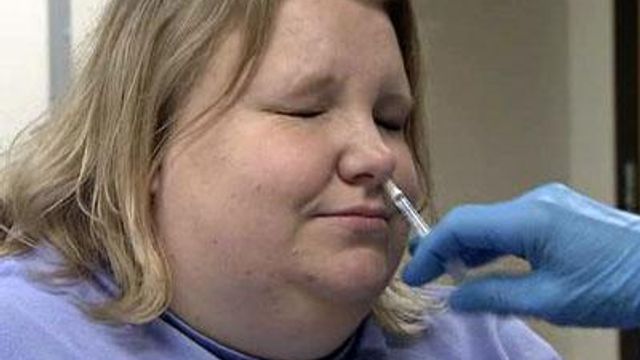Wake County, area colleges fight flu strains
The director of the federal Centers for Disease Control and Prevention toured one of Wake County's four free clinics offering the H1N1 vaccine. Area colleges don't have that vaccine, but are fighting the flu with old-fashioned prevention methods and good hygiene.
Posted — UpdatedDr. Thomas Frieden, director of the federal Centers for Disease Control and Prevention, reviewed Wake County's efforts to give out 3,500 doses of H1N1 vaccine in the form of a nasal spray.
Frieden acknowledged worries that the H1N1 vaccine could lead to hospitalization or death in rare cases, but said it is safe as the normal flu vaccine.
"It needs to be taken seriously," he said. "This flu vaccine was made in exactly the same way, in the same factories, by the same companies, with the same technology and the same safeguards as the seasonal flu vaccine is."
By noon Friday, at least 650 people had gotten the vaccine at four free clinics in Wake County. Health officials said at that rate, the county will run out of the vaccine by early next week. Officials weren't certain when the next shipment will arrive.
Hispanic families made up the majority of families visiting the clinics Friday. Hispanic media have been active in getting the word out to Spanish-speaking people in the area about the importance of getting vaccinated against H1N1.
Officials said no one segment of the population is at greater risk of infection from the virus.
College health clinics have access to the vaccine for seasonal flu but not H1N1. Meanwhile, students seem to be catching both viruses, college health officials said.
This semester, 550 students at Duke University, 989 at the University of North Carolina at Chapel Hill, and over 900 at North Carolina State University have reported flu-like symptoms.
"It's very unusual for us to be seeing this kind of volume this time of year," said Dr. Beth Neel, a staff physician at N.C. State.
In the first week of class, N.C. State's health center saw 23 students with flu-like symptoms, presumably from the H1N1 virus, Neel said. The weekly number of new flu cases quickly jumped into the triple digits. One week alone saw 217 new patients.
Fortunately, Neel said, most cases haven't been severe.
"Generally, folks are having the flu and getting over it," she said.
N.C. State has put up posters urging students to use proper hygiene habits and to skip class and avoid others if they feel sick. Hand sanitizer is ubiquitous throughout campus.
The university has held vaccination two clinics for the seasonal flu vaccine. Officials weren't sure when an expected shipment of the H1N1 vaccine would arrive.
Nationally, 100,000 doses of a shot form of the H1N1 vaccine will be available next week, as well as more of the nasal mist. Children ages 9 and younger require two doses of the vaccine, while older children need only one.
Frieden urged everyone to be proactive about the flu.
"In the U.S., we've had millions of cases of H1N1, and before the season is over, we'll have millions more," he said. "Up till now, the virus has cooperated ... and the vaccine is almost a perfect match."
Vaccine distribution
In the coming weeks, up to 1,600 private doctors, pharmacies and hospitals across North Carolina will receive H1N1 vaccinations. Call your doctor or pharmacy directly for information.
Wake and Cumberland counties are offering only the nasal mist version of the H1N1 vaccine, or FluMist. It is recommended only for people between ages 2 and 49. It is not recommended for for pregnant women, anyone with a long-term health problem or children with asthma.
Priorities for the vaccine will be those who the CDC says are at high risk for the virus.
Wake County considers those to be: people between 2 to 24; caregivers for and members of households with children younger than 2 years old; and health care and emergency medical services personnel who have contact with high-risk populations.
Cumberland County considers those to be: people ages 2 to 23; adults ages 24 to 49 who care for a child younger than 6 months; and health care workers and emergency personnel.
• Credits
Copyright 2024 by Capitol Broadcasting Company. All rights reserved. This material may not be published, broadcast, rewritten or redistributed.






